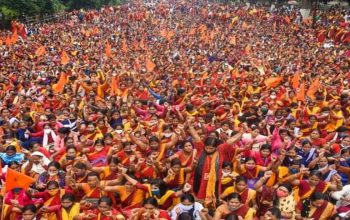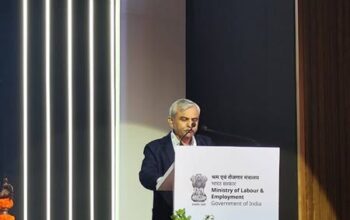BRICS Trade Union Forum, Sochi, Russia
India- Country Reporthttps://youtu.be/fjTMtkDsNE8?feature=shared
By Bharatiya Mazdoor Sangh
Saji Narayanan C.K.,
Ganesh Misra
Introduction
India, as one of the world’s largest and most diverse economies, faces unique opportunities and challenges within its labour sector. India’s employment landscape has been evolving with an increase in gig and platform-based work. The government has introduced measures to regulate the labour sector and provide social security benefits, though challenges remain in ensuring effective labour protection.
Economic Overview
India’s economy, currently the fifth largest in the world in terms of GDP, is one of the fastest growing, with a projected GDP growth rate between 6.5 – 7.2% by different agencies for financial year 2024 – 25. The country continues to demonstrate resilience despite global economic slowdown amid uncertainty. Key drivers of this growth include the services sector, particularly IT, along with significant contributions from manufacturing and agriculture.
The shift towards digitalization and automation is also influencing job structures and skill requirements. Government initiatives like “Make in India,” “Digital India,” and “Atmanirbhar Bharat” have played a pivotal role in boosting domestic production, digital transformation, and self-reliance. In the budget for FY 2024-25 the government has made provisions of Rupees 200 thousand crores for employment linked incentives, which are aimed at creating more decent job opportunities and increasing formalization of the workforce.
Besides unemployment, inequality, rural urban divide etc are also big challenges. Inflation has been a pressing issue for the past few months but it is well under control and receding to normal levels of around 4% as expected. For July 2024 it stood at 3.54%.
Employment Sector in India
Unemployment and underemployment among youth are pressing issues. LFPR (Labour Force Participation Rate) stands at 50.20% for the first quarter of 2024 which is a continuous increase in LFPR for the 12th consecutive quarter. FLPR has also increased to 33% in India. The Government of India has formed a taskforce to examine the prospects of FLPR headed by MoLE and supported by the Women and Child development Ministry.
E Shram Portal
The Government of India has collected data of informal workers through the E- shram portal. Till date, around 300 million informal workers are registered on e-shram portals. It aims at building a comprehensive National Database of Unorganized Workers (NDUW) in the country and to boost the last-mile delivery of the welfare schemes. BMS demands that the existing benefits for unorganised workers like social security benefits, health insurance etc., are integrated with E-Shram cards, and budgetary provisions should be aligned with the data.
Skill development
The new skill development initiatives align educational institutions with industry to make students more employable catering to their career aspirations. Educational improvement is aimed through National Education Policy 2020 introducing Vocational skills, internship, and Employment Linked Incentive Scheme (ELI). The Government is running Recognition of Prior Learning (RPL) program for the workforce through work or other non-formal learning pathways which formally acknowledge and validate the skills, knowledge, and experience that individuals have acquired.
we emphasize the importance of on-the-job training to workers to offer practical experience. There is an urgent need for skill development initiatives, particularly for unskilled and semi-skilled workers ensuring that their skills align with market demands.
Labor Reforms & Trade Unions
Recent years have seen significant changes in India’s labour policies, aimed at simplifying regulations and enhancing worker welfare while improving the ease of doing business. The government consolidated 29 central labour laws into four comprehensive labour codes: 1. the Code on Wages, 2. the Code on Social Security, 3. the Industrial Relations Code, and 4. the Occupational Safety, Health and Working Conditions Code.
Code on Wages: This Code standardizes minimum wages across sectors and states, aiming to reduce wage disparities and ensure fair pay for workers. It ensures for the first time universal minimum wages up to the last worker in the country. It also empowers the workers and trade unions the right to prosecute erring employers.
Code on Social Security: The introduction of the Code on Social Security in 2020 is a significant step towards safeguarding the welfare of workers by expanding social security benefits, including provident fund and insurance, to cover more workers across both formal and informal sectors, including those in the platform, gig and unorganized sector workers, fixed-term employees, and interstate migrant workers, in addition to contract employees.
Industrial Relations Code: This code streamlines dispute resolution processes and introduces more flexibility in employment practices. However, it has sparked concerns about job security, threshold for coverage, right to strike and trade union rights.
Occupational Safety, Health, and Working Conditions Code: This code mandates safe and healthy work environment and regular health checks newly extending to a large number of labour sectors. The changed threshold specified for working conditions especially for the contract labour, factory workers etc., is a major issue.
There are concerns regarding IR code and OSH code and the trade union movement is asking the government to rectify the defects. The government is pursuing dialogues with all trade unions regarding the same and we are hopeful that the conditions may improve soon.
Labour Related Issues
- The large size of informal sector, which comprises nearly 93% of the total workforce is a major concern. This sector encompasses various types of employment arrangements, including self-employment, casual labor, and other non- standard forms of work. A notable share of the workforce is engaged in agriculture and self-employment. Many self-employed individuals run small-scale or family-operated businesses, having significant gaps in job security, income stability, and working conditions.
- Implementation of the existing labour laws has been slow considering the large size of the labour sector, and concerns persist about adequate protection for workers.
- The universalisation of social security needs to be funded well by the Government especially for serving the informal sector. Special funding packages should be provided for social security for labour- intensive sectors like plantation, beedi, agriculture, and fisheries.
- Mahatma Gandhi National Rural Employment Guarantee Act (MGNREGA) is the largest wage employment scheme in the world, which is a demand-driven one. Furthermore, there are scheme workers, including ASHA, Anganwadi, Midday Meal, and National Health Mission (NHM) workers. We are demanding them to be given worker status due to the permanent nature of their employment.
- We are actively advocating for improved regulations and benefits for workers in the unorganised sector, including gig, platform, contractual, and ancillary workers.
- In 2023, the Bharatiya Mazdoor Sangh (BMS) chaired the L20 held in India, focusing on crucial issues through task forces on Universal Social Security, Women & the Future of Work, International Migration, and the Portability of Social Security Funds. The reports of the task forces highlighted grave concerns in the respective areas in the global scenario.
Economic Issues
- Bharatiya Mazdoor Sangh, in a pre- budget discussion has proposed to focus on key areas including Rural Development, MSMEs, Manufacturing, Exports, Infrastructure, and Skill Development to boost earnings, consumption growth, and purchasing power of workers. This approach aims to attract investments.
- Economic, social, and environmental safeguards are required for sustainable enterprises, universal social protection, skill development, health, and strong social institutions.
- We recommend formulating a comprehensive technology policy; creating and appointing a technology committee; regulating a national employment policy; enforcing a wage policy.
Gig Workers
Another rapidly emerging sector in India is the gig economy with an estimated 8 to 18 million jobs as of now. The International Labour Organization (ILO) reports that India is the second largest gig economy in the world, with around 56% of all gig workers in the Asia-Pacific region. This sector has introduced new job opportunities, but it also raises concerns regarding workers’ protections and income stability. These workers often face harsh working conditions, occupational safety and health issues with minimal oversight. Platforms often classify platforms workers as ‘contract workers,’ which can exclude them from benefits such as minimum wages, overtime compensation, annual leave, severance pay, pension schemes, employee provident fund (EPF) accounts, and protections against discrimination.
By adding these workers in the definition in the Social Security Code, the government has officially recognised the gig and platform workers. The Code also provides for setting up a Social Security Fund wherein, companies, including those in ride-sharing, food delivery, grocery delivery, and e-commerce, are required to contribute to social security through aggregators.
Gender Issues
Gender disparities in the workforce continue to be a major issue, especially post COVID. BMS is emphasizing the need for policies that promote women’s participation and equal opportunities in the labour market. There is a critical need to create more avenues for women to contribute fully and advance in their careers, addressing barriers to their participation and fostering a more inclusive and equitable workforce.
Conclusion
India’s economic prospects remain strong, driven by government led initiatives. As the largest national trade union centre, we are on the path of constant dialogue with the Government to reshape the labour laws and make it more labour friendly.
*********





